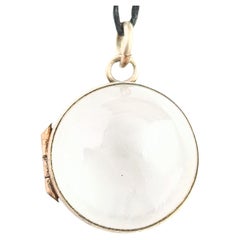Pools Of Light Locket
Recent Sales
Antique Early 1900s British Victorian Pendant Necklaces
Rock Crystal, 9k Gold
Early 20th Century British Edwardian Pendant Necklaces
Crystal, Rock Crystal, Silver, Gilt Metal
Antique 19th Century British Victorian Pendant Necklaces
Rock Crystal, 9k Gold, Yellow Gold
Antique 1890s American Victorian Pendant Necklaces
Rock Crystal, Gold, 14k Gold
Antique 19th Century British Victorian Pendant Necklaces
Crystal, Rock Crystal, 15k Gold, Yellow Gold
Antique 1890s Victorian Pendant Necklaces
14k Gold
Early 20th Century British Edwardian Pendant Necklaces
Crystal, Rock Crystal, Sterling Silver
Antique 1880s British Victorian Pendant Necklaces
Crystal, 15k Gold, Yellow Gold
Finding the Right pendant-necklaces for You
Whether you’re layering multiple jewelry pieces or opting for a single strand, vintage pendant necklaces are versatile accessories that can elevate your casual wear as easily as they can add a creative flourish to your formal attire.
The earliest jewelry was less about accessorizing than it was about wearers arming themselves with amulets. In Ancient Egypt, some amulets featured a loop so that they could be strung around one’s neck. While rubies have long been one of the few gemstones that can give diamonds a run for their money, members of some ancient civilizations valued the stones from the get-go, donning ruby pendants as well as other stones with the belief that these adornments would bring protection, healing powers or strength. Today, we still wear our charm bracelets and charm pendants around our necks for good luck.
Later, pendant necklaces, like most fine jewelry, were worn strictly by royalty or the upper class and conferred wealth and prestige. This changed over time, thankfully, as wearing jewelry became more widespread, a democratized means of personal expression.
During the 18th and 19th centuries, pendant necklaces evolved from their status as spiritual amulets, but the jewels still carried deep personal significance. Victorian pendants, in particular, were part of the “mourning jewelry” tradition. Wearers would embed their pendants with locks of hair from a deceased loved one as a way of grieving in the wake of a loss. In the case of cameo jewelry, some pendants were even decorated with miniature hand-carved portraits in a detailed raised relief. Today, portraiture is still a characteristic of many of the hand-carved pendant necklaces offered by Italian jewelry house Scala Gioielli.
Luxury fine jewelry brands such as Cartier, BVLGARI and David Yurman offer their own unique interpretations of the cherished accessory, embellishing platinum or gold pendant necklaces with diamonds, sapphires and other stones.
On 1stDibs, find an extraordinary range of vintage pendant necklaces and other necklaces today.
- 1stDibs ExpertOctober 12, 2021The best lighting for a pool table won’t be too bright and will reduce glare and shadows on the felt during the game. If the light fixture is immobile, its height should be at least 65 inches, and if it is portable, its height should be at least 40 inches from the bed of the table. Any light directed on the players should not be blinding. On 1stDibs, find a variety of vintage and contemporary lighting solutions for your pool table.

